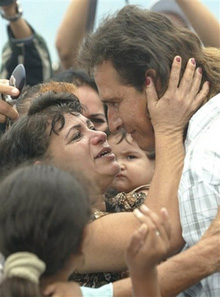Rescued Fishermen Return Home to Defend Their Astounding Tale
 E. Eduardo Castillo - Associated Press E. Eduardo Castillo - Associated Press


| | San Blas fisherman Lucio Rendon, is reunited with his mother Noemi Becerra and family members, upon his arrival to the airport in the northwestern city of Tepic, August 25, 2006. Rendon, along with two other fishermen, who spent months lost and drifting across the Pacific Ocean in a flimsy fishing boat arrived home on Friday to a heroes' welcome. (Reuters/Tomas Bravo) |
Three fishermen who say they survived nine months adrift in the Pacific Ocean returned to Mexico on Friday and vehemently denied media speculation that they were involved in drug trafficking or resorted to cannibalism to survive.

Survivor Jesus Vidana, whose 4-month-old daughter was born while he was at sea, addressed the doubters of his tale, as all three fishermen offered to take a lie detector test.

“I hope what happened to us doesn't happen to them,” Vidana said during a brief news conference the three gave upon arriving at the Mexico City international airport early Friday morning. “Personally, I'm just grateful that I'm here alive.”

Later Friday, one of the three survivors, 28-year-old Lucio Rendon, arrived in his native Pacific coast state of Nayarit, where he was welcomed on the tarmac of the Tepic city airport by a brass band, the local Catholic bishop, state officials, and sobbing family members who embraced him in a long, emotional group hug.

“I'm crying from both nerves and joy,” Rendon's mother, Noemi Becerra, said, tears welling up in her eyes in the moments before her son's plane landed.

“It's like I'm going to see him for the first time. It's as if he's being born all over again.”

Rendon smiled as he was greeted by his parents, two sisters, a grandmother, aunts and uncles.

“Please let me be with my family,” he told the ever-present gaggle of Mexican and international journalists who have followed him since his return to Mexico from the to give him some private time.

He and his relatives later traveled in a bus lent by the state governor to their hometown of San Blas, where a Mass and community meal, as well as an intimate family gathering, were planned for the weekend.

Mexican and international news media have raised questions about the veracity of the fishermen's story, sugggesting the possibility that they were drug traffickers.

Mexico's attorney general says there is no evidence that the fishermen were smuggling drugs, but that officials would continue to look into the case because their hometown is considered to be in a drug trafficking zone.

Vidana, Rendon and fisherman Salvador Ordonez, say they left the Mexico port of San Blas, in Nayarit, on Oct. 28, 2005. They were rescued 285 days later by a Taiwanese fishing boat near the Marshall Islands, 8,000 kilometers (5,000 miles) away.

The fisherman said they set out with the boat's owner and another man on a shark-fishing expedition they expected to last a few days. But their 27-foot (8.23-meter) open boat with no cabin was swept out to sea and they ran out of gas. Exposed to the elements, the three survived by eating raw fish and birds and drinking rain water.

Ordonez said that shortly after leaving, the crew lost its fishing equipment and was ordered by the boat's owner, whom the three survivors knew only as “Senor Juan,” to look for it. Ordonez said he recommended against it, “but he told me he could do what he wanted because he was the owner,” he said. They ran out of gas during the search, he said.

Both “Senor Juan” and another man died after they refused to eat the raw food, the fishermen said. “Senor Juan” died in January, while the second man died in February, the fishermen said Friday.

Over the months, prevailing currents pushed their spartan boat across the Pacific. They passed their time reading the Bible, singing and dancing. Earlier this month, they were spotted by the fishing vessel.

During the news conference, Rendon addressed doubts about their story.

“Those who are fisherman know these things happen,” he said.

When asked if they would take a lie detector test, all three emphatically responded, “of course.”

Asked why they appeared to be in such good physical health following their ordeal, Ordonez said their rescuers fed them a great deal of food and made sure they rested.

“They treated us very well, with air conditioning, and they didn't let us go out into the sun,” said Ordonez, nicknamed “El Gato,” or “The Cat,” by boatmates for his bird catching skills. “They gave us a lot of food.”

With their return, the Mexican news media on Friday seemed to embrace the astonishing tale of the three plainspoken fishermen, whose tearful family members appeared in television broadcasts from their homes in the coastal states of Nayarit and Sinaloa.

Vidana's wife was too emotional to speak as she held her sleeping baby girl in a television studio.

Asked what they planned to do next, Ordonez, from a small fishing port in the Pacific coast state of Oaxaca, replied, “see the family for three or four days and then get back to work.”

Olga Rodriguez in Tepic, Mexico, contributed to this report. |



